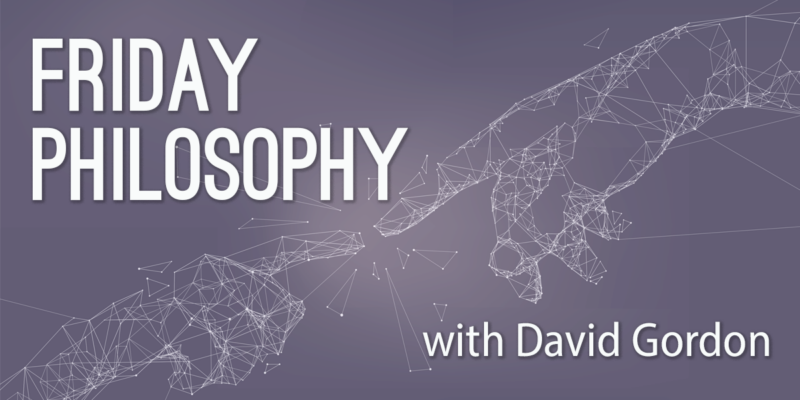
How States Think: The Rationality of Foreign Policy
by John J. Mearsheimer and Sebastian Rosato
Yale University Press, 2023; 304 pp.
How States Think surprised me. John Mearsheimer is a well-known critic of American foreign policy, and his analysis of the Ukraine war has been deservedly influential. As result, I anticipated that this book would expand his critique. The book does contain some critical discussion of American foreign policy, but, for the most part, the aims of Mearsheimer and his coauthor, Sebastian Rosato, lie elsewhere.
They endeavor to show that most of the time states are rational actors in their relations with one another, and their arguments for this thesis take them into areas that students of Austrian economics will find of great value. Their criticisms of competing theories of rationality have parallels in Austrian theory. After Mearsheimer and Rosato set forward their theory of rational action, they apply it to a number of case studies. In these studies they proceed to show that the states they discuss were rational actors, distinguishing between “grand strategy,” roughly a state’s long-term plans, and “crisis situations.” They also give examples in which states acted irrationally, but they conclude that these are atypical.
I have said that Mearsheimer and Rosato raise points of interest to Austrians, but you might suspect from the book’s title that they ignore a basic fact about human action often stressed by Ludwig von Mises: only individuals act and, one presumes, think. If that is so, how can the authors ask how states think? States aren’t individuals. But the authors are well aware of this issue, contending that state actions must be “cashed out” in the plans and decisions of the leaders of these states.
But if state actions consist of the actions of those in charge of state policy, what determines whether these actions are rational? Do rational actors try to maximize expected utility? According to this approach, an actor ranks the utility of each course of action open to him numerically or quasi numerically. Each course of action results in different possible outcomes, depending on what other actors do. The utility ranking of each action is then multiplied by the probability of its outcome, and the action with the highest product is said to have the greatest expected utility.
Mearsheimer and Rosato sound like Austrians in what they say about this theory of rationality. The utilities of the courses of action cannot be ranked cardinally, and the probability estimates of the outcomes are often unknown. They discuss Frank Knight’s views on uncertainty and then say:
In an uncertain world, actors cannot acquire the information needed to evaluate the likely consequences of pursuing different strategies. When “knowledge” is “uncertain,” observes John Maynard Keynes, “there is no scientific basis on which to form any calculable probability estimate whatever.” . . . The difference between worlds of risk and uncertainty—or what are called “small” and “large” worlds—cannot be overemphasized.
The defenders of expected utility have a response to this. Even if the relevant numbers are unknown, we can act as if they were known so long as doing so leads to successful predictions. Austrians will recognize that this was Milton Friedman’s strategy, and Mearsheimer and Rosato reject it:
Friedman went so far as to maintain that the best theories “will be found to have ‘assumptions’ that are wildly inaccurate descriptive representations of reality, and, in general, the more significant the theory, the more unrealistic the assumptions.” This assertion is implausible: a theory whose starting assumptions are descriptively false is unlikely to offer a good explanation of how the world works. As Ronald Coase wrote in response to Friedman’s claim, “Realism in our assumptions is needed if our theories are ever to help us understand why the system works in the way it does. Realism in assumptions forces us to analyze the world that exists, not some imaginary world that does not.”
What do Mearsheimer and Rosato propose to put in place of expected utility theory? They tie rational action to having a credible theory about the way the world works. As they put it, “rationality is about process rather than outcomes.” As it turns out, a whole host of theories meet these requirements, so passing the test amounts to less than the authors take it be. The test doesn’t require that the state actor’s theory of the world be better than competing accounts but only that it has something to be said for it. The authors count as reasonable theories that they themselves believe are bad ones. For example, Mearsheimer was a trenchant critic of the North Atlantic Treaty Organization’s expansion after the end of the Cold War, but the expansionist theory still counts as reasonable. Among the credible theories are several others, such as mutually assured destruction, which could result in the annihilation of human life on earth. This is a low bar indeed for what counts as a credible theory. (By the way, we learn that the technical term for having so potent a nuclear arsenal that you can wipe out your enemy’s ability to retaliate is a “splendid” first-strike capacity.) There is an additional requirement for rational state action, but this too is not very demanding. The policy chosen must result from deliberation among the main policy makers rather than be the decision of a leader in “splendid” isolation.
If Mearsheimer and Rosato’s account of reasonable state action isn’t very demanding, it isn’t vacuous either. Some theories are unreasonable, for example those that go counter to clear historical evidence.
Forcible democracy promotion theory and domino theory [which holds that a revolution tends to spread to neighboring states] are both noncredible. It is clear from the historical record that attempts to force democracy on other states almost always fail. . . . The United States’ dismal track record before the Iraq invasion made this clear. . . . There is also hardly any evidence that domino theory works as advertised.
Though the authors make many valuable distinctions in their discussion of alternative theories of rationality, and though their work rests on prodigious scholarship, they need to toughen up what they require of a credible theory. My readers won’t be surprised that I criticize a view for too much tolerance.








